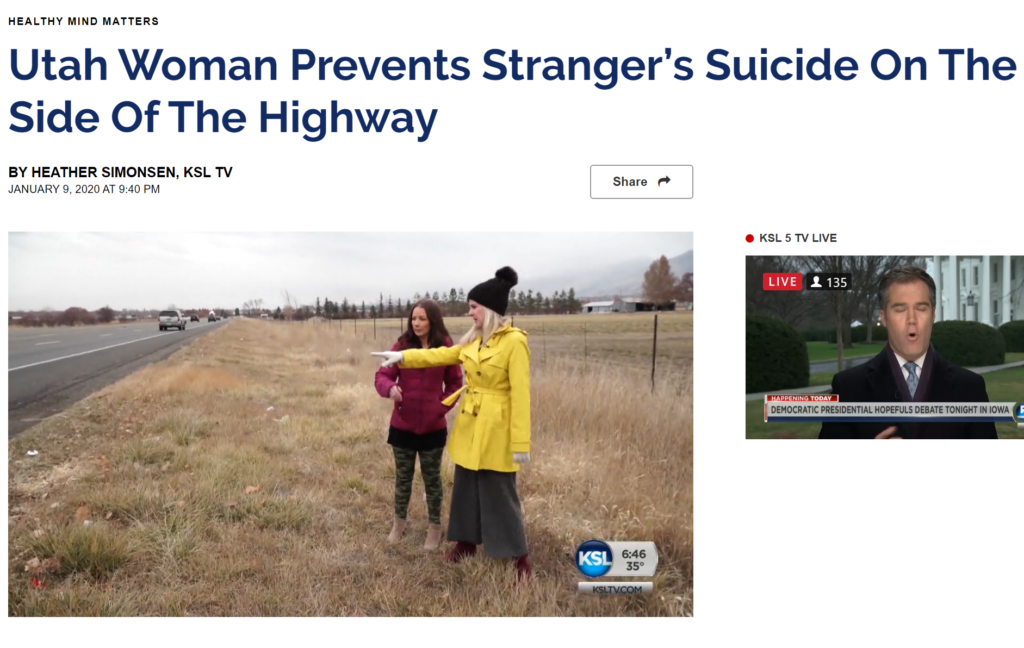
Did you see this!?
This is an amazing story!
I have to admit after reading it, I questioned myself. Would I have stopped? Would I?
Honestly, I grew up with stories of the horrors of Ted Bundy and the warning that a woman should never ever pick up a strange man. I probably wouldn’t have, probably.
But that isn’t the intent of the story, to convince women that it is worth the risk because she might save someone from dying by suicide. The point was that for her it was the right choice. She felt something. She was aware. She asked if someone was in crisis.
She asked if someone was in crisis. That is the point of the story. She asked.
In a society of increasing isolation, I think fewer and fewer people are asking. This story reminds us that we need to do better. That’s all. Just ask.
In the article, they mention QPR training. Question. Persuade. Ask. I have not been QPR trained, but I think I would like to be. I think that with more people trained, there would be more people asking, talking, helping.
STORY: Utah Woman Prevents Stranger’s Suicide On The Side Of The Highway
What would you do if you saw something troubling on the side of the road? That’s the question a Paradise woman faced when she came upon a mental health emergency.
In this Healthy Mind Matters report, News Specialist Heather Simonsen reports that what she did next made all the difference. “It immediately struck me that something was off,” said Kelli Snider of Paradise.
While driving south on State Route 165 near Providence on November 4th, she saw a young man standing on the side of the highway. “It’s a 55 mph highway. It’s five lanes. There’s a lot of traffic that goes through here throughout the day,” said Sgt. Cade Brenchley, with the Utah Highway Patrol.
“He was just standing all alone, hands in his pocket,” Snider said. “I tried to dismiss it. I thought, ‘Really? I’m the only one who thinks there’s something strange about this? I just kept looking back in my rearview mirror and I thought, ‘No, something is wrong.’”
Snider got gas and circled back about 10 minutes later, thinking he’d probably be gone. “And he was still there,” she said. “And I knew that that was supposed to be right then. I just touched his arm and I said, ‘Are you feeling suicidal?’ you know, ‘Is this what’s going on’? And with tears in his eyes, he reached into his pocket and handed me a long, handwritten suicide note.”
He agreed to sit in her car. “He didn’t speak at all, but I was able to sit with him as he cried silently,” she said. Snider did her best to reassure him. “That he had value, and that he was loved.” And encouraged him to hang on.
Brenchley said, “A lot of people will fight that instinct and they’ll think someone else will do something, and then they continue on. It definitely never hurts to go with your gut.”
Therapists agree, and they’ve created CPR for mental health emergencies that anyone can do. It’s called QPR: Question, Persuade, Refer. Ask the person if they are thinking about hurting themselves. Persuade them that there is hope and to get help. Finally, refer them to mental health services.
“Oftentimes it’s the people in our own lives, in your own circle, your family members, friends, siblings, neighbors, so pay attention. It’s okay to butt in. It’s okay to ask the question,” said Jessica Strong, Community Health Manager, Primary Children’s Hospital. In fact, the question often comes as a relief, as it did for the young man Snider stopped to help.
“Who knows what you could be missing out on, please choose to stay,” Snider said.
That kind of despair is something Snider knows about first-hand. In her early 20s, she suffered from severe depression.
“When he looked me in the eye, I just recognized that defeated, that hopeless look,” she said.
Because she had been there, she knew she had to take action.
Brenchley said, “She saved his life. I’m just so grateful that I was given the courage in that moment to act on that inspiration, and that I didn’t keep driving, because I almost did.”
Saving a life, by being there to help. If you think someone is in danger, call the suicide prevention hotline at 1-800-273-TALK. If you’d like more information on QPR classes and how to register for them, visit utahsuicideprevention.org and click on Education and Training. You’ll find Intermountain QPR there.